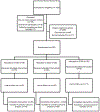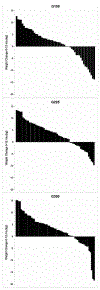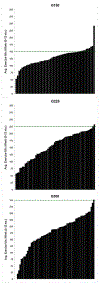A Randomized Trial Evaluating Exercise for the Prevention of Weight Regain
- PMID: 34494375
- PMCID: PMC9260853
- DOI: 10.1002/oby.23022
A Randomized Trial Evaluating Exercise for the Prevention of Weight Regain
Abstract
Objective: This study aimed to evaluate the effectiveness of three levels of exercise on weight regain subsequent to clinically meaningful weight loss (WL).
Methods: Adults with overweight or obesity (n = 298) initiated a 3-month behavioral WL intervention, which included reduced energy intake, increased exercise, and weekly behavioral counseling. Participants achieving ≥5% WL (n = 235) began a 12-month behavioral WL maintenance intervention and were randomized to 150 min/wk (n = 76), 225 min/wk (n = 80), or 300 min/wk (n = 79) of partially supervised moderate-to-vigorous-intensity exercise.
Results: Participants randomized to 150, 225, and 300 minutes of exercise completed 129 ± 30, 153 ± 49 and 179 ± 62 min/wk of exercise (supervised + unsupervised), respectively. Mean WL at 3 months (9.5 ± 3.1 kg) was similar across randomized groups (P = 0.68). Weight change across 12 months was 1.1 ± 6.5 kg, 3.2 ± 5.7 kg, and 2.8 ± 6.9 kg in the 150, 225, and 300 min/wk groups, respectively. Intent-to-treat analysis revealed no significant overall trend across the three treatment groups (P = 0.09), effects for group (P = 0.08), or sex (P = 0.21).
Conclusions: This study found no evidence for an association between the volume of moderate-to-vigorous-intensity exercise and weight regain across 12 months following clinically relevant WL. Further, results suggest that exercise volumes lower than those currently recommended for WL maintenance, when completed in conjunction with a behavioral weight-maintenance intervention, may minimize weight regain over 12 months.
© 2020 The Obesity Society.
Conflict of interest statement
Figures




Comment in
-
Is More Exercise Better to Prevent Weight Regain? The Jury is Still Out.Obesity (Silver Spring). 2021 Jan;29(1):16. doi: 10.1002/oby.23053. Obesity (Silver Spring). 2021. PMID: 34494377 No abstract available.
Similar articles
-
Intervening on exercise and daylong movement for weight loss maintenance in older adults: A randomized, clinical trial.Obesity (Silver Spring). 2022 Jan;30(1):85-95. doi: 10.1002/oby.23318. Obesity (Silver Spring). 2022. PMID: 34932885 Free PMC article. Clinical Trial.
-
Weight loss maintenance following an augmented intervention for early slow weight loss responders: An adaptive trial.Transl Behav Med. 2024 May 24;14(6):368-376. doi: 10.1093/tbm/ibad077. Transl Behav Med. 2024. PMID: 38011653 Free PMC article. Clinical Trial.
-
Effect of exercise duration and intensity on weight loss in overweight, sedentary women: a randomized trial.JAMA. 2003 Sep 10;290(10):1323-30. doi: 10.1001/jama.290.10.1323. JAMA. 2003. PMID: 12966123 Clinical Trial.
-
American College of Sports Medicine position stand. Appropriate intervention strategies for weight loss and prevention of weight regain for adults.Med Sci Sports Exerc. 2001 Dec;33(12):2145-56. doi: 10.1097/00005768-200112000-00026. Med Sci Sports Exerc. 2001. PMID: 11740312 Review.
-
Physical activity considerations for the treatment and prevention of obesity.Am J Clin Nutr. 2005 Jul;82(1 Suppl):226S-229S. doi: 10.1093/ajcn/82.1.226S. Am J Clin Nutr. 2005. PMID: 16002826 Review.
Cited by
-
Effect of exercise training on weight loss, body composition changes, and weight maintenance in adults with overweight or obesity: An overview of 12 systematic reviews and 149 studies.Obes Rev. 2021 Jul;22 Suppl 4(Suppl 4):e13256. doi: 10.1111/obr.13256. Epub 2021 May 6. Obes Rev. 2021. PMID: 33955140 Free PMC article. Review.
-
Pre-post intervention exploring cognitive function and relationships with weight loss, intervention adherence and dropout.Health Psychol Behav Med. 2023 Jan 6;11(1):2162528. doi: 10.1080/21642850.2022.2162528. eCollection 2023. Health Psychol Behav Med. 2023. PMID: 36632603 Free PMC article.
-
Physical activity and exercise for weight loss and maintenance in people living with obesity.Rev Endocr Metab Disord. 2023 Oct;24(5):937-949. doi: 10.1007/s11154-023-09805-5. Epub 2023 May 5. Rev Endocr Metab Disord. 2023. PMID: 37142892 Review.
-
The Role of Physical Activity in Minimizing Recurrence of Weight Gain Following Metabolic and Bariatric Surgery: Current Evidence and Suggestions for Advancing Future Research.Curr Obes Rep. 2025 Aug 21;14(1):66. doi: 10.1007/s13679-025-00658-4. Curr Obes Rep. 2025. PMID: 40836203 Free PMC article. Review.
-
Pathological Significance of Macrophages in Erectile Dysfunction Including Peyronie's Disease.Biomedicines. 2021 Nov 10;9(11):1658. doi: 10.3390/biomedicines9111658. Biomedicines. 2021. PMID: 34829887 Free PMC article. Review.
References
-
- Jensen MD, Ryan DH, Apovian CM, et al. 2013 AHA/ACC/TOS guideline for the management of overweight and obesity in adults: a report of the American College of Cardiology/American Heart Association Task Force on Practice Guidelines and The Obesity Society. Circulation 2014;129(25 suppl 2):S102–S138. - PMC - PubMed
-
- Saris WHM, Blair SN, van Baak MA, et al. How much physical activity is enough to prevent unhealthy weight gain? Outcome of the IASO 1st stock conference and consensus statement. Obes Rev 2003;4:101–114. - PubMed
Publication types
MeSH terms
Grants and funding
LinkOut - more resources
Full Text Sources
Medical

